Is Laravel the Right Choice for Your eCommerce Website?
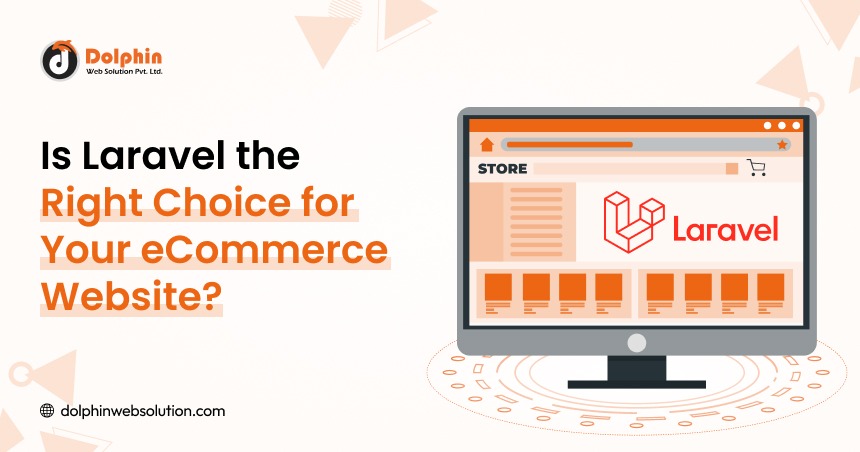
Table of Contents
Summary :
Laravel is a popular framework for e-commerce development. It is suitable to build scalable, feature-rich, and secure online stores. It offers benefits such as customization, security, and scalability for creating e-commerce stores. In this blog, let's explore if Laravel is a suitable option for your e-commerce store.
Introduction
Laravel is a well-known PHP framework for building web apps. It offers a clean and simple syntax, making coding easier. This framework follows the Model-View-Controller (MVC) style, which helps efficiently organize code. With Laravel, developers can build sites that are both fast and reliable. All these make laravel developers usage statistics for its powerful features and flexibility.
When it comes to e-commerce, choosing the right tech is key. A strong framework like Laravel boosts security and speeds up development. It has built-in tools for user login and database tasks. This saves you routine work and offers more time for creativity. Plus, using Laravel
can lead to a smooth shopping experience for users.
In this blog post, let’s explore all about Laravel and how it can help you build top-notch e-commerce stores.
What is Laravel?
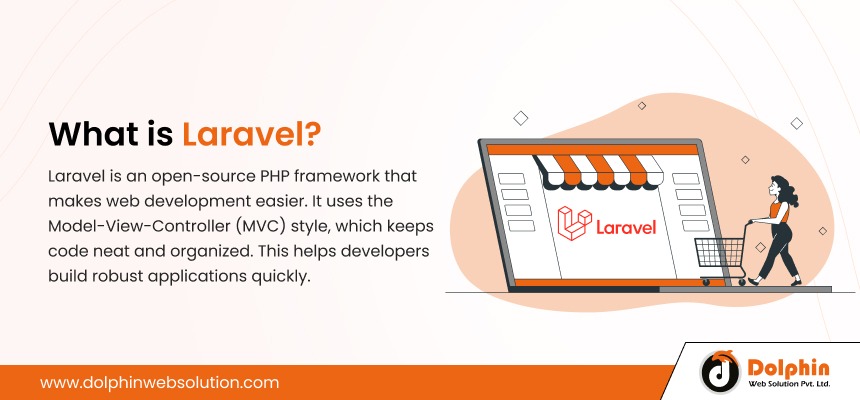
Laravel is an open-source PHP framework that makes web development easier. It uses the Model-View-Controller (MVC) style, which keeps code neat and organized. This helps developers build robust applications quickly.
Laravel also comes with a range of core features that make it easier for developers to build e-commerce sites with Laravel.
Here are the most important ones:
- Elegant Syntax: The syntax in Laravel is clean and easy to read. Developers can write less code and do more, which leads to fewer mistakes and faster work.
- Eloquent ORM: Laravel includes Eloquent, a handy Object-Relational Mapping tool. It allows simple database queries using PHP instead of complex SQL.
- Routing System: The framework has a flexible routing system. This makes it easy to define routes for applications, boosting performance. This is vital for an online store as competition is high in the e-commerce industry.
- Security Features: Security is built into Laravel from the start. It protects against common threats like SQL injection and CSRF. Hence, you can ensure that your e-commerce store will stay safe from cyberattacks.
- Blade Template Engine: The Blade template engine simplifies creating dynamic layouts. Developers can use reusable components, making design work smoother.
Benefits of Using Laravel for eCommerce
Laravel has become a top choice for building e-commerce sites. Its features cater to the unique needs of online stores. This ensures a smooth shopping experience for users.
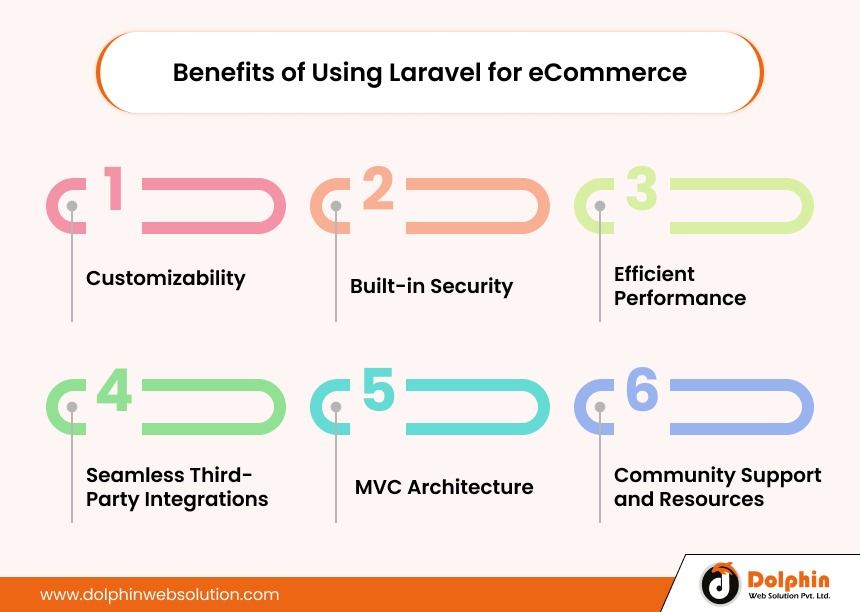
Let’s dive into the benefits of using Laravel for e-commerce.
1. Customizability
One major benefit of Laravel is its high customizability. Developers can easily modify the framework to fit specific needs. Want to add unique payment options? Or maybe custom product pages? Laravel makes it simple to do both.
The modular structure allows easy integration of custom features. This means your e-commerce site can stand out and reflect your brand.
2. Built-in Security
Security is a big concern for online businesses today. According to a report by Cybersecurity Ventures, cybercrime will cost USD 10.5 Trillion in 2025. Laravel addresses this with several built-in security features.
It uses encryption and hashing to protect sensitive data, such as customer information and payment details. The framework also employs Bcrypt for password hashing to keep user passwords protected. Laravel guards against cross-site request forgery (CSRF) attacks. Each session generates a unique token that verifies requests, blocking unauthorized actions.
This focus on security builds trust with customers, which is vital for any e-commerce site.
3. Efficient Performance
High-traffic e-commerce sites need efficient performance to handle many users at once. Laravel offers various performance optimization options for this purpose.
Caching mechanisms are built into the framework, which allows developers to store frequently accessed data temporarily. This reduces load times and enhances user experience significantly. Plus, Laravel’s routing system is quick, ensuring quick responses to user requests.
With these optimizations, your e-commerce platform can handle higher traffic without any issues.
4. Seamless Third-Party Integrations
E-commerce businesses often rely on various third-party tools and services. Laravel excels in this area by offering seamless integrations.
You can integrate payment gateways, analytics tools, and more into the Laravel store with no trouble. Need to connect with Stripe for payment processing? Or Google Analytics for tracking user behavior? Laravel makes it easy to integrate these services without hassle.
This also ensures you can enhance your store’s functionality while ensuring a smooth user experience.
5. MVC Architecture
The Model-View-Controller (MVC) architecture is another reason why Laravel is great for e-commerce development. This structure separates application logic from the user interface. It makes it easier to manage and scale your project over time.
Developers can work on different parts of the application without conflicts. For example, changes in the user interface won’t affect the underlying logic or database interactions.
This separation leads to cleaner code and better organization, which is crucial for most e-commerce systems.
6. Community Support and Resources
Laravel boasts a vibrant community that offers extensive support and resources. Developers can find tutorials, forums, and documentation that help solve problems on anything.
This community-driven approach ensures best practices are shared widely among users. These support resources are also mostly free. Regular updates also keep the framework secure and up-to-date with modern web standards.
Laravel stands out as a top pick to build robust e-commerce sites that meet today’s demands. Whether you’re starting a new online store or improving an existing one, Laravel provides the tools you need to succeed in the competitive e-commerce landscape today.
But how does it compare with other similar platforms in the market? Let’s find out.
Laravel vs. Other eCommerce Platforms
Choosing the right technology is crucial when building an online store. There are diverse technologies to choose from, like Laravel, Magento, Shopify, and more. Each option has its strengths and weaknesses, making it vital to learn how they compare.
Let’s explore Laravel with other similar technologies like Magento, Shopify, and WooCommerce with the help of a table.
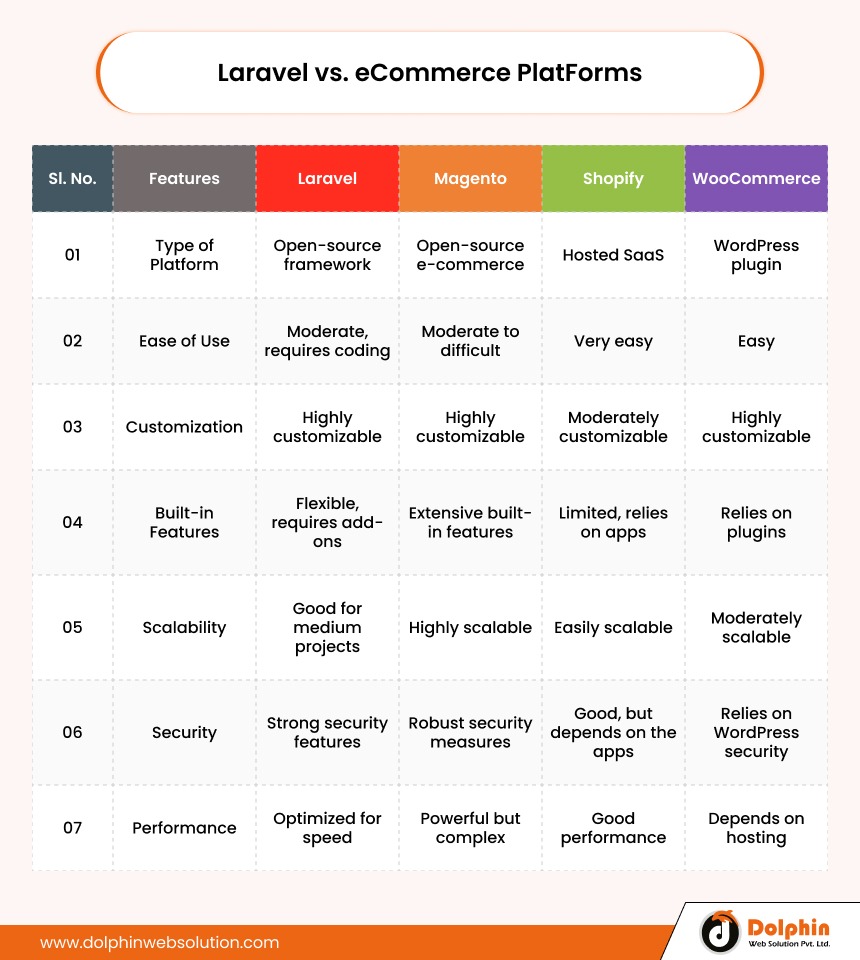
When to Choose Laravel
Based on the comparison, Laravel is suitable for custom solutions and sites that need flexibility in design. Laravel is best when you need a highly customizable e-commerce solution. It allows developers to create unique features tailored to specific business needs.
Challenges to Consider
Building an e-commerce site with Laravel comes with its own set of challenges. There are also many pros and cons of Laravel you need to consider.
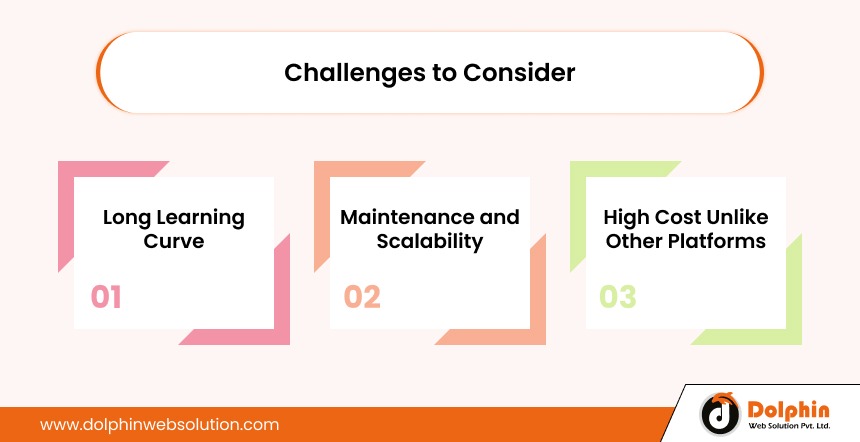
Let’s weigh the cons of Laravel and see how to address these hurdles.
1. Long Learning Curve
One challenge is the learning curve associated with Laravel. While it has a clean syntax, developers still need a solid understanding of PHP and web development concepts.
If your team lacks experience with Laravel, it may take time to get up to speed. This can slow down initial development and lead to delays in launching your site.
2. Maintenance and Scalability
Another factor to consider is maintenance. Custom-built solutions need ongoing updates and support. As your business grows, you may need to scale your application.
While Laravel is designed for scalability, managing this growth can need extra resources. Hence, take this into account while choosing Laravel for development.
3. High Cost Unlike Other Platforms
Consider the cost and time investments before choosing Laravel. Building a custom online site with Laravel can be more expensive than using a SaaS platform like Shopify. These platforms come with built-in features that save time and money upfront.
Of course, Laravel offers greater flexibility. However, the initial development costs can be higher due to custom coding needs.
Who Should Choose Laravel for eCommerce?
Laravel is an excellent choice for e-commerce development, but it’s not for everyone. Understanding when to choose Laravel over other platforms helps you make the right decision.
If your e-commerce store needs custom or unique features, Laravel is the best choice. Its flexibility allows developers to create tailored solutions that meet specific business needs. For example, if you need a custom checkout process, Laravel can handle these demands effectively.
Laravel is also designed to support applications that need to scale. If you expect high traffic during sales events like Black Friday/Cyber Monday, Laravel’s architecture can meet it without performance issues.
When a Different Platform Might Be a Better Fit
If you need a simple e-commerce store and you prefer a quick setup, Shopify or Magento may be better options. These platforms offer user-friendly interfaces and built-in features that simplify the development process.
For businesses with tight budgets, ready-made solutions are the best as they come at a lower cost. You can also save on Laravel developer costs with such an option.
However, choosing Laravel is ideal for projects requiring customization, scalability, and complex functionality.
Laravel to Help Build Your Online Store
Laravel offers a range of strengths and weaknesses for e-commerce development. Its scalability and security features make it ideal for businesses that want to grow. The framework’s customizability allows developers to create unique solutions tailored to specific needs. But, the learning curve can be steep. Plus, the cost and time needed to make a custom store are higher than using ready-made platforms.
Hence, consider these unique pros and cons of Laravel to make the right choice. The best strategy is to hire Laravel developers. They can help you leverage the framework’s potential and navigate its challenges effectively. And if you are looking for a reliable team of Laravel developers, Dolphin Web Solution is the best option.
Contact us to get a free consultation call for Laravel e-commerce development.

Hello!
Click one of our contacts below to chat on WhatsApp

